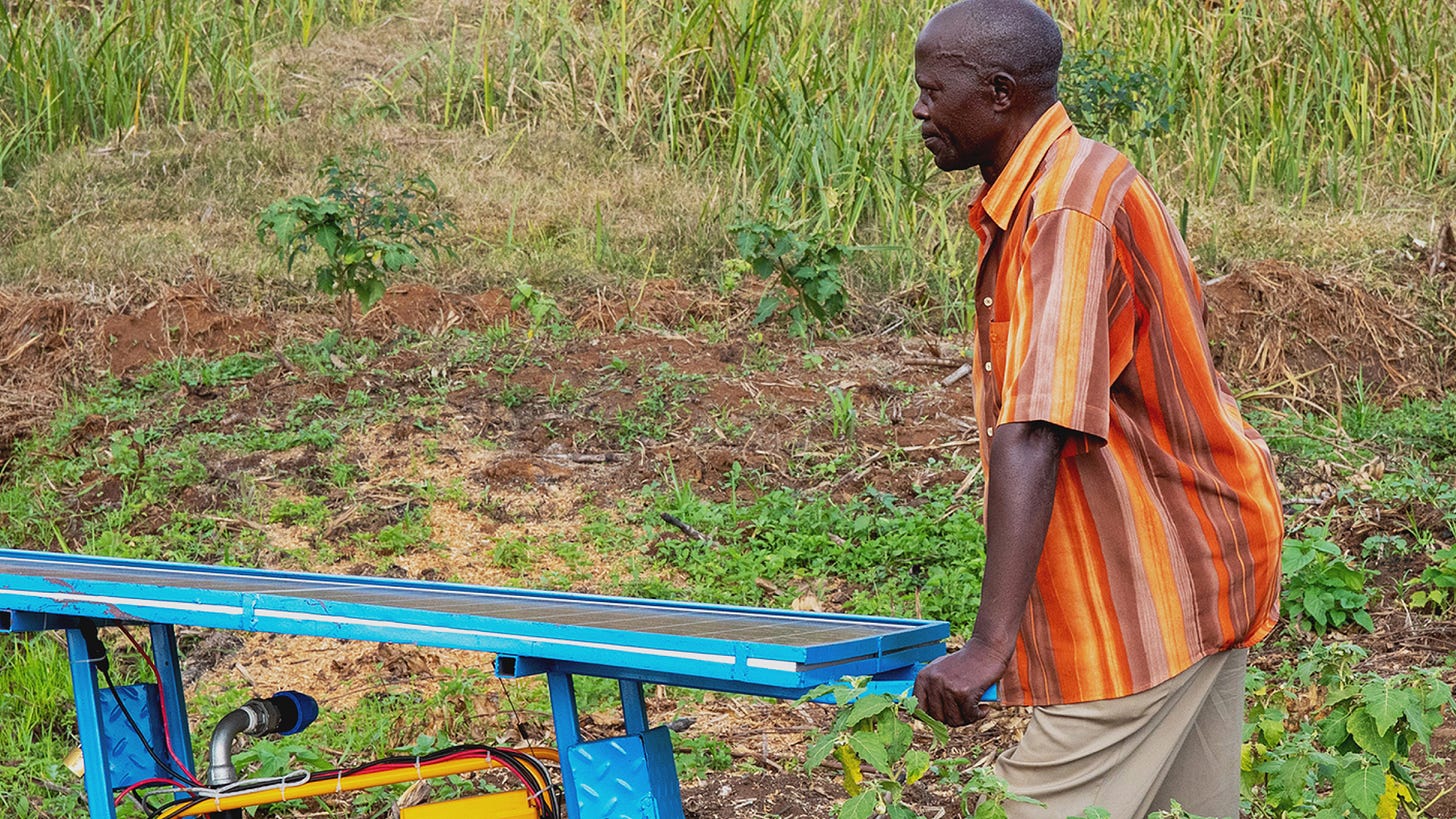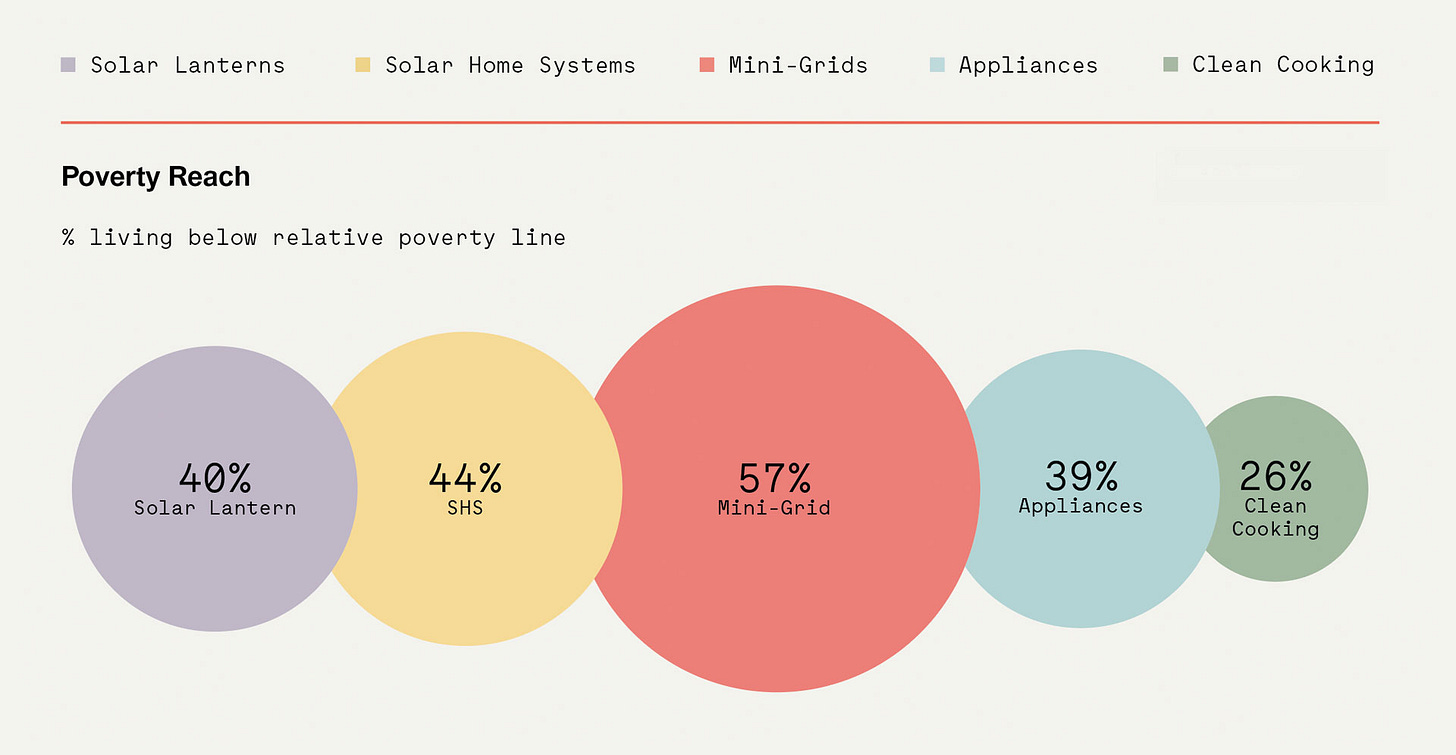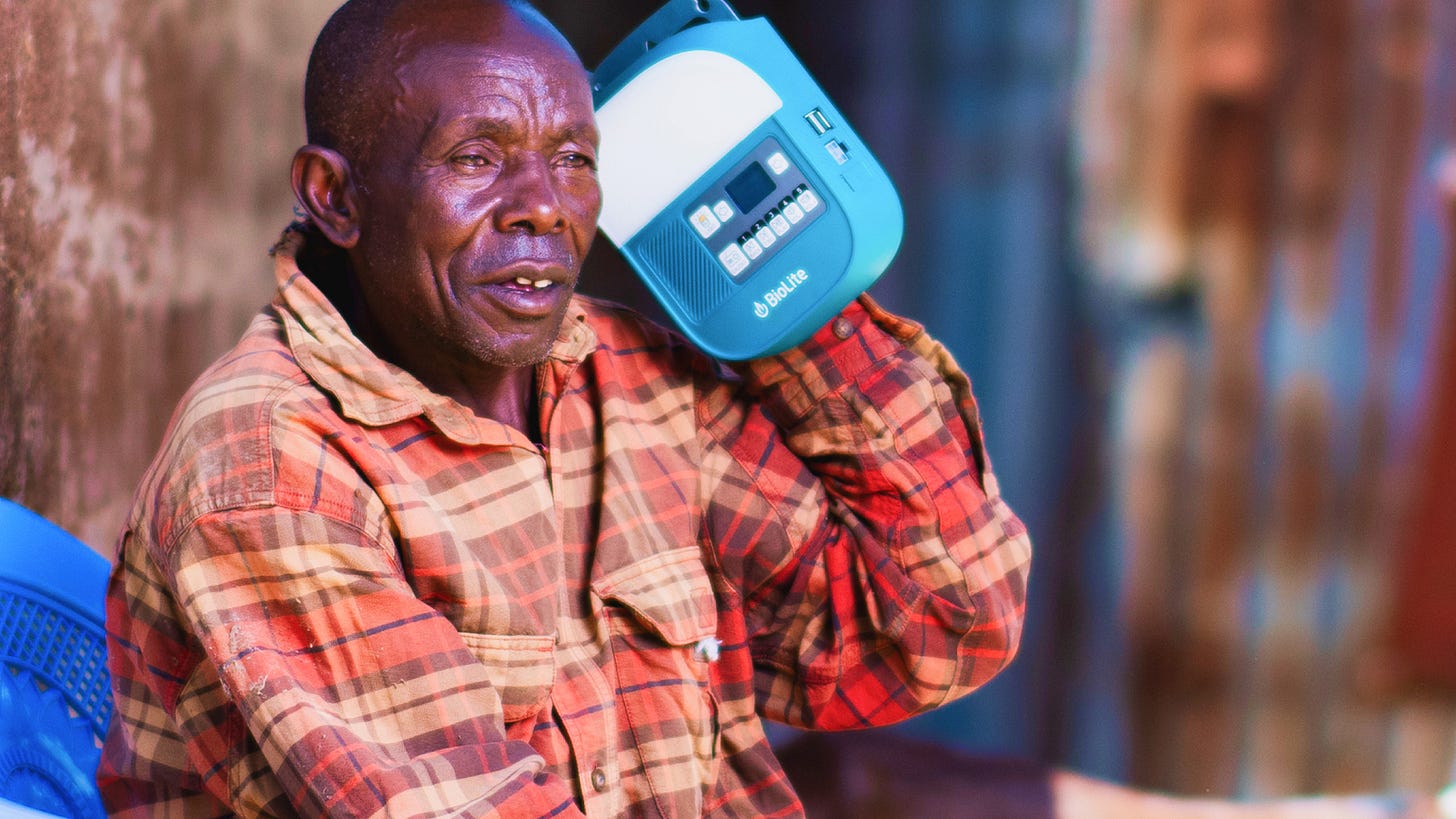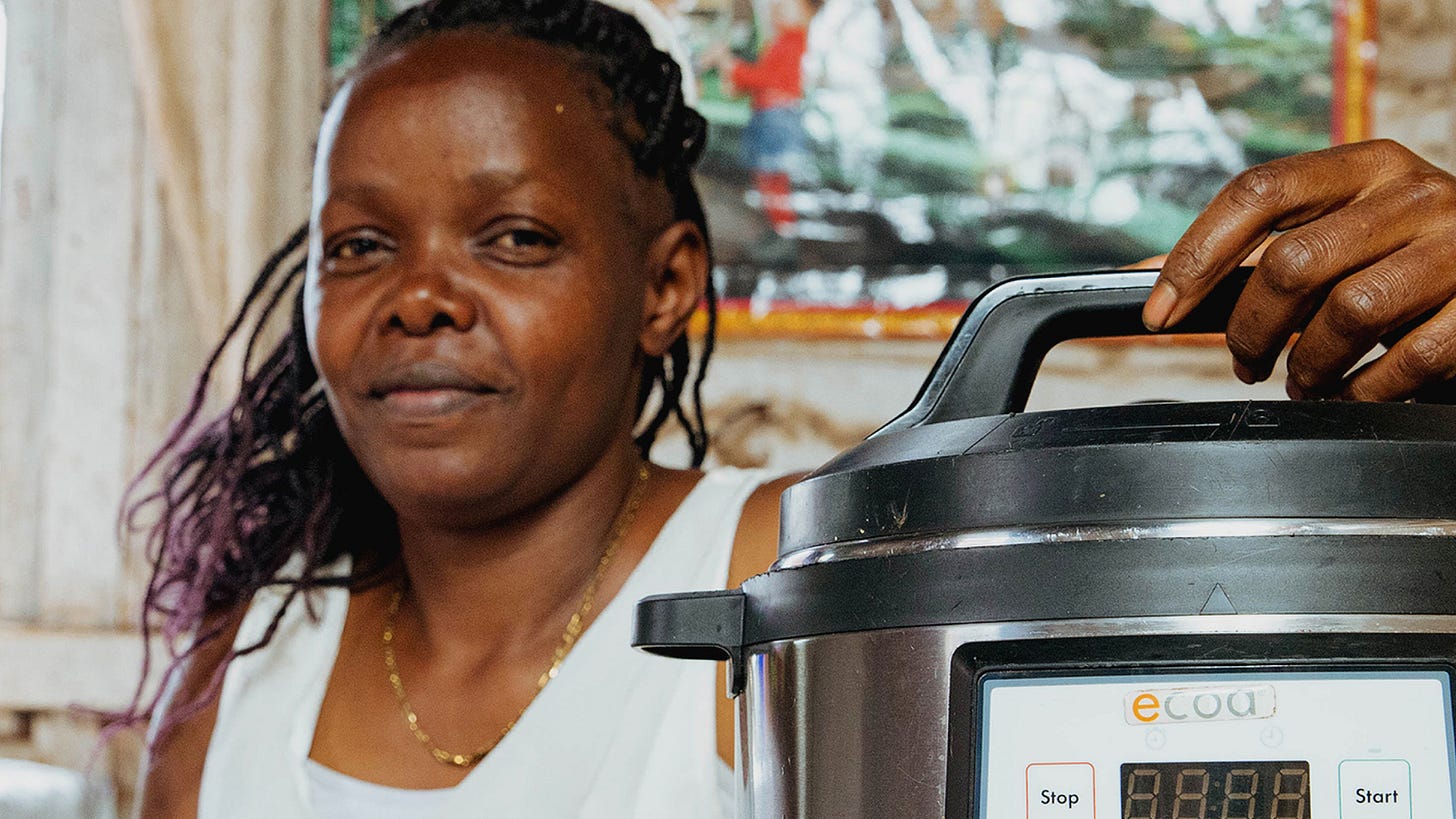The Transformative Power of Solar Off-Grid Energy Solutions
by Kat Harrison, Director at 60 Decibels
Nearly 10% of the globe’s 8 billion people still lack reliable access to energy. Small-scale, off-grid renewable energy is poised to change that. The off-grid energy sector is making a material difference for hundreds of millions around the globe, and we have new data to prove it.
60 Decibels recently published the world’s most comprehensive impact assessment of the off-grid sector to date, Why Off-Grid Energy Matters 2024. For more than half of all customers, the quality of their and their families’ lives improved significantly as a result of their new-found energy access. Here’s a rundown of some of the key findings and what we can learn when connecting hundreds of millions more:
Solar solutions are small yet mighty
Some 64% of customers told us a simple solar lantern brought a significant change to their wellbeing, while 62% said a new solar home system had a major impact on them. Three-quarters of customers said this was the first time having access to a product of this category.
“We are now in a state of immense joy because the light has come to chase away the darkness in our lives,” a 50-year old man in Togo, told us. “Before I had the solar kit, I had to pay twice a week to have my phone battery recharged by people 3 kilometres from my house.”
The report offers a reminder that small, available solutions can be highly effective in moving away from polluting and expensive alternatives. Once again, the small but mighty solar lantern stands out as a pound-for-pound champion despite sometimes costing as little as $5.
Rural and poor customers are seeing the biggest impact
Over half of the 79,000+ customers surveyed live in rural areas, where they reported both higher impact and satisfaction than the sector average. Many of these geographies contribute the least to climate change impacts, yet they bear the brunt of its consequences.
Customers living in rural areas are three times more likely to be living in poverty than their urban peers, multiplying the impact of reaching last-mile customers. Rural customers are also more likely to see improved safety, health, knowledge, and convenience benefits from gaining energy access.
According to our calculations, distributors in the off-grid sector are 80% of the way to seeing their customer base match the poverty profile of their respective geographies, on average. This is better than the other large sectors we work in (agriculture and financial inclusion), but still shows some room for improvement. Given that most of the people still disconnected from the grid live in rural, poor areas, if companies target these geographies, they can enter new markets and see the exceptionally high impact of their product.
Financing: a tool for expanding reach, but not without its problems
Financing is hugely prevalent in the off-grid energy sector – with three-quarters of customers surveyed using some form of financing to pay for their energy access. For a variety of reasons, customers’ income may be seasonal or uneven. Rural customers, in one case, predominantly farm, which is often variable and seasonal. This uneven income stream may have implications on their ability to pay for off grid products before a harvest or in January when African school fees tend to be due (which we find a large proportion of people’s income and savings go to).
While pay-as-you-go expands reach to customers who might otherwise have been unable to access power, it also occasionally leads to over-indebtedness. Five percent of those surveyed found payments for their energy device to be a significant financial burden, and 30% said they had fallen behind on payments at some point. Why do people fall behind? A loss of income, increased living costs, and emergencies are the most common responses.
To pay closer attention, we introduced our Consumer Protection Score in partnership with the global association for the off-grid solar energy GOGLA. This benchmark explores customer awareness of key contract terms, customer ability to pay, and ease of use. In other words, it looks at key themes such as transparency and fair pricing when off-grid energy customers are purchasing a new product or service. Findings revealed that a third of customers experience some Consumer Protection related challenges – this is an important starting point from which to improve. Note that we're presenting averages, which can erase nuances between product categories, companies, countries, etc.
A third of customers experience challenges using their energy product or service
Notably, a substantial third of customers experienced some sort of challenge using their energy product or service, on average. These challenges span four themes:
Technical fault: when a product malfunctions.
Mismatched expectations: when customers anticipate different outcomes.
Misuse: when customers use products incorrectly, often due to a lack of awareness or training.
External factors: when factors beyond anyone’s control, like theft or environmental issues, disrupt product usage.
When this happens, customers and their families can’t unlock the many benefits of improved energy access. Overall, the off-grid energy sector performs well globally regarding customer satisfaction, with a Net Promoter Score® (NPS) of 43. However, the NPS for those with unresolved issues falls to 1. Improved design, accurate sales and marketing materials, training and installation for users, and great after-sales care can increase the impact of off-grid energy products on the people they serve.
First-time customers are more likely to face challenges, emphasising the need for targeted support during initial product usage. Successful companies should focus on the experience of early adopters, especially in nascent markets; their satisfaction and recommendations to peers and networks can significantly impact sales and growth.
71% of customers who faced challenges have yet to see them resolved. A review and improvement of issue resolution policies and processes is a must for the sector.
Locally-owned and/or women-led enterprises are impact all-stars
Switching gears to think about evaluating the companies and organisations that offer off-grid products, we found some pretty exciting findings: locally-owned organisations have a higher social impact, female reach, poverty reach, ease of use and satisfaction rates than their peers, and women-led enterprises boast greater impact and female reach, lower consumer over-indebtedness rates, and lower challenge rates.
The bad news? Both women-led and locally-owned companies are woefully underrepresented in the flows of capital being invested in the off-grid energy sector. This is a missed opportunity for positive impact.
While acknowledging the good work of the many male-led, mostly Western pioneers in the sector, we hope these findings challenge the industry to open doors, start conversations, and unlock more capital in this direction.
Celebrating top performers in the sector: Energy Top Impact Awards
By asking standardised questions to end-users across the board, we are able to provide benchmarks on impact performance and enable organisations to understand impact relative to peers. Our Energy Benchmarks serve as a resource to guide thinking for performance targets and improved organisational efficiency for off-grid energy organisations.
We recently celebrated the energy organisations who ranked top for impact – determined through results from the experiences of the 79,000+ customers we listened to – from 140+ companies in 30+ different countries globally. These organisations have demonstrated exceptional performance in delivering these services and making a positive impact on the lives of customers.
Viewing this sector through both a decarbonisation and social impact lens will give companies the tools to ensure their clean energy products can reach the right markets. We see a clear connection between company satisfaction and impact – social impact and environmental priorities must be seen as complementary as we work to connect the next hundred million to a clean grid.
🍿 The Lean Back
Don’t miss our conversation with Kim Stanley Robinson here.
🎙️ My Climate Journey Podcast
✨ Kim Stanley Robinson, renowned science fiction author of Ministry of the Future, the Mars trilogy, and more joined Cody for a discussion about his relationship with nature, his views on capitalism, society, government and technology. We also cover Stan’s writings, his views on climate change and the path ahead for us all. Listen to the episode here.
🗳️ Cody and Brandon Hurlbut discuss the intersection of policy and innovation, including Brandon’s work at Boundary Stone Partners and the types of problems they help companies navigate. They also delve into the 2024 US election and cover what's at stake from a climate change perspective in the presidential, House, and Senate elections. Listen to the episode here.
👩💻 Climate Jobs
For more open positions, check out the #j-climatejobs channel in MCJ Slack as well as our MCJ Job Board.
Procurement Manager and Production Manager at Crusoe (Arvada, CO)
Operations Manager at Dance (Paris, France)
Customer Success Manager at David Energy (Brooklyn, NY)
Partnerships Manager at Enode (Remote/Europe)
Senior Electrical Engineer at Lightship (Broomfield, CO)
Senior iOS Engineer at Lun (Copenhagen, Denmark)
Master Electrician at Quilt (Redwood City, CA)
Director of Mechanical Engineering at Remora (Wixom, MI)
Customer Success Associate at Runwise (New York, NY)
Manager, Policy and Regulatory Affairs at WeaveGrid (Remote)
✨ Portfolio Highlights
🎙 Shashank Samala, CEO and Co-founder at Heirloom, was a guest on How I Built This with Guy Raz, discussing the company’s carbon capture location and major milestone.
🎉 Adam Braun, Philip Charm, and the entire team at Clarasight celebrated the company’s fresh rebrand.
🏅 Sublime Systems was awarded $6.7 million in funding from the U.S. Department of Energy (DOE)’s Industrial Efficiency and Decarbonization Office (IEDO), and $87 million from DOE’s Office of Clean Energy Demonstrations (OCED)!
🏡 Arch raised a $6.2 million Seed round to boost residential heat pump installation. Read it on Tech Crunch here.
💡 Naman Trivedi, CEO and Co-founder of WattBuy was a guest on the Watt it Takes Podcast.
🗓 Events
Click the event title for details & RSVP info. For more climate events, check out the #c-events channel in MCJ Slack.
🍻 Seattle Eastside Climate Tech Happy Hour: Meet old and new friends, check out some robots, and talk about climate tech. (Mar 28)
🧱 Industrial Decarbonization Beyond Steel & Cement by MCJ Collective + 9Zero: Are you curious about the state of affairs in chemical decarbonization? What are the requirements and biggest pain points? How do we look beyond cement and steel at a vast chemical industry? Join us for a great panel and networking event around industrial decarbonization. (Apr 3)
👩💻 MCJ + Climate People Climate Career Advancement Meetup: April’s ‘Ask the Experts’ Meetup will see us jump into small group discussions with four recruiters, community builders, and experts specialized to your career stage. You’ll have the opportunity to ask them questions, hear their advice, meet others at a similar career stage to you, and generally skill up as you look to take your next career steps. (Apr 10)
The MCJ Collective Newsletter is a free weekly email curating news, jobs, My Climate Journey podcast episodes, and other noteworthy happenings in the MCJ member community.
💭 If you have feedback or items you’d like to include, feel free to reach out.
🤝 If you’d like to become an MCJ community member, apply today.
💡 Have a climate-related event or content topic that you'd like to see in the MCJ newsletter? Email us at content@mcjcollective.com






